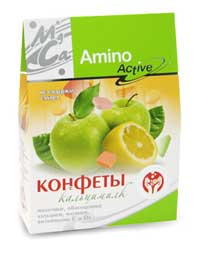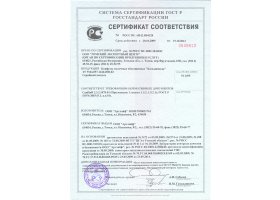Candy Calcimilk with the taste of apple and lemon
Milk candy - an additional source of calcium, magnesium and vitamin D3 → Buy
→ Buy
Marking:
#800 - 100 gr.
Weight:
128gr.
Description:
Candies milk-enriched Calcimilk tasteful apple and lemon - a product of functional food, contributing to the shortfall in dietary intake of minerals, calcium and magnesium, and vitamin D3. Calcimilk helps to restore normal bone tissue, preventing the rapid loss of bone mass.
The main components of the product are: calcium, part of the candy in the form of hydroxyapatite is produced from the fins of sharks and is a balanced and biologically available form of phosphorus and calcium, which is the mineral matrix of bone, magnesium - creates a balance with calcium, vitamin D3 in the form of holikaltseferola - bioavailability and the most digestible form of vitamin D3: powdered milk, which contains in its composition oligosaccharide lactulose promotes normal digestion of milk in connection with what is increased and calcium absorption.
Calcium is deposited in bone tissue and activates activity of several key enzymes involved in maintaining ionic equilibrium in the body, affect the processes occurring in the neuromuscular and cardiovascular systems that affect blood clotting. The mineral calcium is needed for adults and children. In the body, calcium is involved formation of the skeleton and especially the children need for normal growth of the body, tooth formation, prevention of tooth decay, strengthen tooth enamel. Additional calcium intake in childhood prevents the development of allergic reactions, decreased vascular permeability in inflammatory diseases (ARD, bronchitis). In addition, calcium is important for menopausal women, since its absorption is slowed down by decreasing levels of estrogen (female hormone). Therefore, women in menopause are advised to take Calcimilk for prevention of osteoporosis, fractures, and motor inactivity, stress as a sedative.
Magnesium is actively functioning as a cofactor in more than 300 known enzymatic reactions involved in protein biosynthesis, the transfer of genetic information. It is needed for transmission of nerve impulses, so it is sometimes called Antistress element. Magnesium helps one to suppress depression and maintains a healthy circulatory system. It is deposited in bones and soft tissues. Mineral promotes bone growth and normalization of the functions of muscles, strengthens tooth enamel. Magnesium deficiency leads to increased deposition of calcium salts in the walls of the arteries, heart muscle and kidney. Magnesium deficiency in children during the first years of life may be one of the causes of rickets resistant to vitamin D.
Vitamin D3 is in the form holikaltseferola - biologically available and the most digestible form of vitamin D3. Holikalitsiferol chemical structure is a steroid structure, which as a result of intracellular metabolism is a building material for the synthesis of hormones and cholesterol. In addition, it supports the level of inorganic phosphorus and calcium in the plasma above the threshold and increases calcium absorption in the small intestine, thus preventing the development of rickets and osteomalacia. In the cells of the intestinal mucosa vitamin D3 stimulates the synthesis of carrier protein required for the transport of calcium. Absorption of phosphorus is also stimulated by vitamin D. The daily requirement for vitamin D3 children about 7,5 mg, 10 mg adults.
| Candy Pantogemka with strawberry taste | Candy Probiomilk |
Is the medicine:
No
Expiration date:
2 years from the date of manufacture.
Storage Conditions:
stored at temperatures no higher than 20 C +
Ingredients:
gidroksiappatit calcium, ascorbic acid - vitamin C, vitamin D3, magnesium oxide, milk powder, lactose, citric acid, food dye (E 142 - green), food flavoring, aspasvit (£ 951 - Aspartame E 954 - saccharin). Nutritional supplements with index E are approved for use by the Ministry of Health, as safe. Nutritional value: 100 grams of sweets include: protein 21.3 g, Fat 29.58 g, 38.23 g carbohydrates, 3.4 g of calcium, magnesium 211 mg, 375 mg vitamin C, 536; vitamin D3 2 mg (80 IU) . Energy value of 100 g of chocolates: 504.3 kcal.
Certificate:
